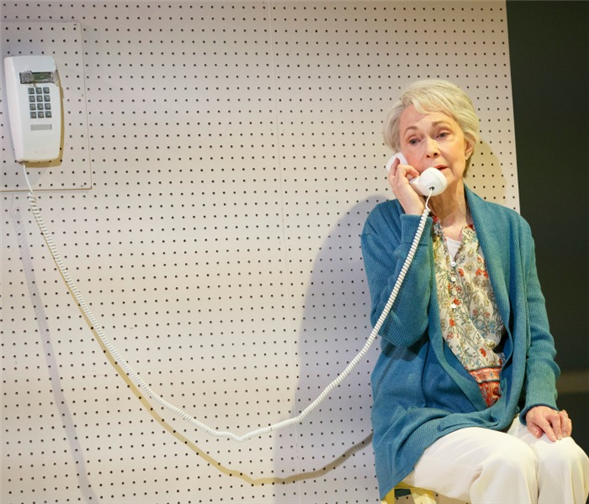Translate Page

Tony winner Deanna Dunagan plays a struggling widow in The Treasurer
---
Welcome to Building Character, TDF Stages' ongoing series on actors and how they create their roles
Chicago-based actress Deanna Dunagan -- best known to New York audiences for her Tony-winning turn as the drug-addicted matriarch in August: Osage County -- loves to talk on the phone. It's one of the many ways she relates to Ida, the character she plays in Max Posner's world-premiere play The Treasurer, currently in previews at Playwrights Horizons. Many of the show's most affecting moments happen while Ida is on her old-school landline. The telephone has become a beacon of hope for Ida, a new widow grappling with financial and health woes. With every ring comes the potential for companionship, no matter who's on the other end. It could be her son, a wrong number, or someone seeking a donation to the local orchestra -- Ida greets them all with equal enthusiasm.
Beyond their shared loquaciousness, Dunagan also relates to Ida through the lens of her late mother. "My mom lived to be one month shy of 98," Dunagan says. "I watched her go through the process of aging. She had such a vitality, especially when she was younger. She was the first woman to run for the school board in our small Texas town. People actually threw garbage on our lawn to protest her running for office because she was a woman. But that didn't stop her. Ida reminds me of her. She is a life force. Ida's not perfect, but she tried to make a difference. She's a woman who had passions and she went after them."
For Ida, pursuing those passions meant leaving her first husband and three children; the youngest, known simply as the Son (played by Tony nominee Peter Friedman), has never forgiven her. We meet him as a middle-aged man with grown children of his own. In the wake of his stepfather's death, his siblings tap him to clamp down on Ida's lavish spending -- his harsh opinion of his mother seems to make him the ideal candidate for the job.
"I have a son and it's heartbreaking to think of being so at odds with your own child," Dunagan says. "I think all the Son wants is for Ida to acknowledge the sacrifices he's making to take care of her, and Ida is searching for love from him. Neither of them are able to give the other what they need."
{Image1}
While the show explores a host of themes -- loneliness, abandonment, familial responsibility versus individual happiness -- the financial burden of aging in America is perhaps the most timely. As life expectancy and the cost of living continue to rise, the goal of retirement is becoming elusive. That weighs heavily on Ida and the Son, too, as he's had to dip into his own savings to support his mother. Ida admits she never thought she'd live as long she has. So she didn't save for a future she didn't anticipate.
While Dunagan sympathizes with Ida's situation, she's thankful not to be in the same boat. "I'm fortunate to have enough money to live out the rest of my life, so I didn't bring my own fear to this," Dunagan says. "But I know many people who can't afford to retire. I have a friend whose husband is nearing 80 and he can't quit his job. It's the reality for a lot of people."
During the course of the play, Ida's health begins to fail, and it's a journey Dunagan struggles to calibrate. "I think that it's really important as an actor to keep in mind that Ida isn't anyone to be pitied," she says. "The playwright, Max Posner, has done such a beautiful job of creating this kaleidoscope of decline. But pity, pity denigrates. It robs people of their dignity and I don't ever want that to happen to Ida. Even at her most dire points, I never want it to cross into pity."
The truly difficult scenes, Dunagan says, are when Ida is on the phone. As the play progresses, those chats become more and more emotionally fraught. The phone is Ida's link to others, her main asset in her attempts to quell her loneliness. "For Ida, it's a way to still matter," Dunagan says. "To stay relevant, to be vital, to be alive."
---
Follow Haley Chouinard at @HaleyChouinard. Follow TDF at @TDFNYC.
Top image: Deanna Dunagan in The Treasurer. Photos by Joan Marcus.
TDF MEMBERS: Go here to browse our latest discounts for dance, theatre, and concerts.